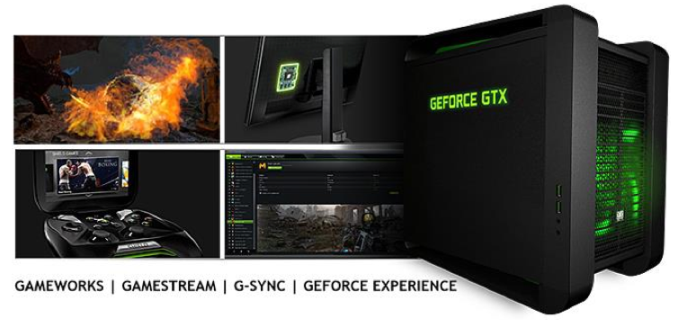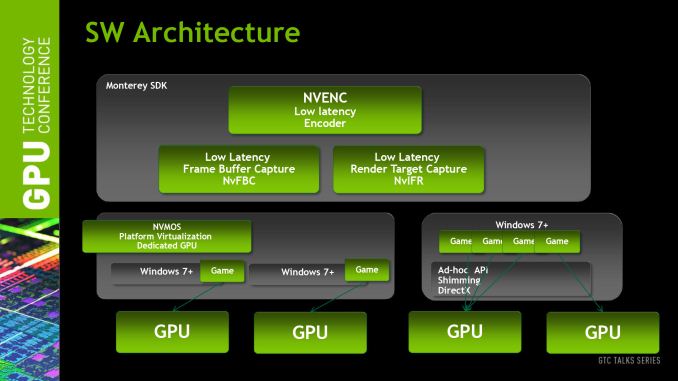The NVIDIA GeForce GTX 750 Ti and GTX 750 Review: Maxwell Makes Its Move
by Ryan Smith & Ganesh T S on February 18, 2014 9:00 AM ESTMaxwell’s Feature Set: Kepler Refined
To start our look at the Maxwell architecture, we’ll start with a look at the feature set, as this will be the shorter and easier subject to begin with.
In short, Maxwell only offers a handful of new features compared to Kepler. Kepler itself was a natural evolution of Fermi, further building on NVIDIA’s SM design and Direct3D 11 functionality. Maxwell in turn is a smaller evolution yet.
From a graphics/gaming perspective there will not be any changes. Maxwell remains a Direct3D 11.0 compliant design, supporting the base 11.0 functionality along with many (but not all) of the features required for Direct3D 11.1 and 11.2. NVIDIA as a whole has not professed much of an interest in being 11.1/11.2 compliant – they weren’t in a rush on 10.1 either – so this didn’t come as a great surprise to us. Nevertheless it is unfortunate, as NVIDIA carries enough market share that their support (or lack thereof) for a feature is often the deciding factor whether it’s used. Developers can still use cap bits to access the individual features of D3D 11.1/11.2 that Maxwell does support, but we will not be seeing 11.1 or 11.2 becoming a baseline for PC gaming hardware this year.
On the other hand this means that for the purposes of the GeForce family the GTX 750 series will fit in nicely into the current stack, despite the architectural differences. As a consumer perspective is still analogous to a graphics perspective, Maxwell does not have any features that will explicitly set it apart from Kepler. All 700 series parts will support the same features, even NVIDIA ecosystem features such as GameWorks, NVENC, and G-Sync, so Maxwell is fully aligned with Kepler in that respect.
At a lower level the feature set has only changed to a slightly greater degree. I/O functionality is identical to Kepler, with 4 display controllers backing NVIDIA’s capabilities. HDMI 1.4 and DisplayPort 1.2 functionality join the usual DVI support, with Maxwell being a bit early to support any next generation display connectivity standards.
Video Encode & Decode
Meanwhile turning our gaze towards video encoding and decoding, we find one of the few areas that has received a feature upgrade on Maxwell. NVENC, NVIDIA’s video encoder, has received an explicit performance boost. NVIDIA tells us that Maxwell’s NVENC should be 1.5x-2x faster than Kepler’s NVENC, or in absolute terms capable of encoding speeds 6x-8x faster than real time.
For the purposes of the GTX 750 series, the impact of this upgrade will heavy depend on how NVENC is being leveraged. For real time applications such as ShadowPlay and GameStream, which by the very definition can’t operate faster than real time, the benefit will primarily be a reduction in encoding latency by upwards of several milliseconds. For offline video transcoding using utilities such as Cyberlink’s MediaEspresso, the greater throughput should directly translate into faster transcoding.
The bigger impact of this will be felt in mobile and server applications, when GM107 makes its introduction in those product lines. In the case of mobile usage the greater performance of Maxwell’s NVENC block directly corresponds with lower power usage, which will reduce the energy costs of using it when operating off of a battery. Meanwhile in server applications the greater performance will allow a sliding scale of latency reductions and an increase in the number of client sessions being streamed off of a single GPU, which for NVIDIA’s purposes means they will get to increase the client density of their GRID products.
Speaking of video, decoding is also receiving a bit of a lift. Maxwell’s VP video decode block won’t feature full H.265 (HEVC) support, but NVIDIA is telling us that they will offer partial hardware acceleration, relying on a mix of software and hardware to decode H.265. We had been hoping for full hardware support on Maxwell, but it looks like it’s a bit premature for that in a discrete GPU. The downside to this is that the long upgrade cycle for video cards – many users are averaging 4 years these days – means there’s a good chance that GTX 750 owners will still be on their GTX 750 cards when H.265 content starts arriving in force, so it will be interesting to see just how much of the process NVIDIA can offload onto their hardware as it stands.
H.265 aside, video decoding overall is getting faster and lower power. NVIDIA tells us that decoding is getting a 8x-10x performance boost due to the implementation of a local decoder cache and an increase in memory efficiency for video decoding. As for power consumption, combined with the aforementioned performance gains, NVIDIA has implemented a new power state called “GC5” specifically for low usage tasks such as video playback. Unfortunately NVIDIA isn’t telling us much about how GC5 works, but as we’ll see in our benchmarks there is a small but distinct improvement in power consumption in the video decode process.












177 Comments
View All Comments
formulav8 - Tuesday, February 18, 2014 - link
Overall their drivers have been fine for a long time. NVidia and AMD run into bugs time to time. I'm sure you know NVidia has bugs as well. Just because you don't see them doesn't mean there are none and that NVidia is perfect.dgingeri - Wednesday, February 19, 2014 - link
yeah, well, I've never had bugs with my Nvidia cards to the degree of the bugs with my two AMD/ATI video cards. I had that 4870X2 for over a year and a half, quietly waiting for them to fix the bugs in the drivers to get it to properly use the second GPU, only to have them completely abandon me at the 10.1 driver and beyond.extide - Tuesday, February 18, 2014 - link
So, really, not even a single mention of Maxwell's marquee feature, "Unified Virtual Memory?" I think you guys got a little bit caught up in the power/watt increase, and entirely forgot about that!kwrzesien - Tuesday, February 18, 2014 - link
It will probably be unveiled with the 800 series cards. It might be baked into the die but not enabled in this revision or it might be there but not enabled in the drivers. What we want to wait for is the 860/880 which will have the muscle to do something amazing with UVM.jwcalla - Tuesday, February 18, 2014 - link
I don't think UVM will provide much in the way of benefits other than making some CUDA programming [marginally] easier.doubledeej - Tuesday, February 18, 2014 - link
Is anybody ever going to produce a decent single slot video card again? I'm getting a little tired of either having low-end, slow cards, or having all of my PCIe slots being covered up.DanNeely - Tuesday, February 18, 2014 - link
Probably not. Making a quiet card is much easier in a 2 slot form factor; and the number of people who care about performance and need the slot immediately below their GPU is a very small fraction of the total.On a tangent, legacy PCI is facing extinction because it's been removed from Intel's current chipsets and is only available via a bridge chip. If you have a long term need for it; I'd advise buying a current generation mobo with an unobstructed slot while they're still on the market.
TheinsanegamerN - Tuesday, February 18, 2014 - link
you mean like the geforce 680 single slot edition that never came out? yeah, I wish companies would actually make those things.FelixDraconis - Tuesday, February 18, 2014 - link
I really like the direction this card is going in. Especially if there's a DisplayPort variant coming. It's tough building a low power ITX system with DP without using onboard graphics.But what's up with the 750 name? That's just blatantly misleading, as the 760 has been out for almost a year now and is an older process, while originally Maxwell was slated to be called 8XX. Nothing new, but boy is this confusing. I guess it makes short term sense for marketing, as it always does.
jwcalla - Tuesday, February 18, 2014 - link
Obviously they're reserving the 800 series for the 20nm parts.